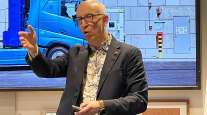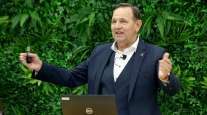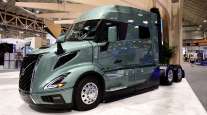Volvo Execs Share Concerns Over Expected GHG Proposal
EDITOR’S NOTE: Additional coverage from this event will be included in the May 25 print edition of Transport Topics.
NEWPORT, R.I. — Göran Nyberg, president of Volvo Trucks in North America, said there is one key element the federal government should remember as it finalizes its new greenhouse-gas emissions rule proposal for heavy-duty trucks.
“We have better engineers than legislators,” he said here May 16 during a briefing with reporters as part of festivities surrounding the North American stopover of the Volvo Ocean Race.
His comment came a day after other Volvo executives told dealers and fleet customers at an event in Providence, Rhode Island, the joint proposal from the Environmental Protection Agency and National Highway Traffic Safety Administration likely will include an engine-only standard.
IMPROVED FUEL ECONOMY: Volvo touts gains in 2016 trucks
The result could be “forcing technology on the market before it is ready,” said Tony Greszler, vice president of government and industry relations for Volvo Group, which includes Mack Trucks. “This is shades of what happened previously with the pre-buy” ahead of earlier engine emission standards being implemented.
The proposal is expected to be published in June, three months later than its initial target.
Susan Alt, senior vice president of public affairs for Volvo Group, called for the government to set one target and allow companies to develop their own plans for meeting it.
“The industry could face a mandate for increased engine efficiency that actually reduces total vehicle efficiency,” she said.
Greszler also expressed concern about suggestions the rule could extend to 2027, saying there likely will be technologies available then that we cannot imagine now.
Meeting new engine targets could require a focus on waste heat recovery, Greszler said.
He shared an illustration showing the large number of new components that would need to be added to the engine system.
“Truck buyers would be the losers,” Alt said of a separate engine standard in the new proposal.
“We want to do what is right for the environment but also what is right for the industry,” Nyberg said. “The wrong way is to add too much complexity to our products."




